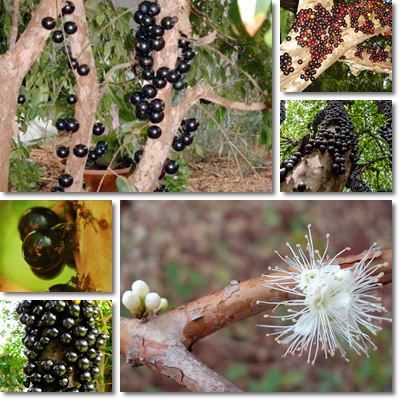Jabuticabeira, jaboticaba or jabuticaba (Plinia cauliflora) is the sweet fruit of a Brazilian native tree with the same name. Unlike other fruits, jabuticabas grow on the trunk of the tree, making quite a remarkable view out during the fruit-bearing period. In addition to being a tropical delight, the fruit also boasts several impressive health benefits that can be attributed to high levels of antioxidants with benefits over all systems, astringent properties and a good nutritional profile.
The dark color of the skin is indicative of high concentrations of antioxidants, hence the potent anti-inflammatory, antioxidant and antiaging properties of the fruit.
Moreover, jabuticaba is used to improve respiratory conditions such as asthma, treat diarrhea and stop hair loss. Due to its good vitamin and mineral content, it makes an excellent tonic and strong detox food. The fruit helps boost energy levels and reducing fatigue.

What does jabuticaba look like?
Botanically speaking, jabuticaba is a berry. It is about the size of a plum, round and plump. It looks very much like a big, dark-colored grape. Ripe jabuticabas have a thicker, dark-purple, almost black skin and either glossy white or rose soft, jelly-like flesh. Unripe ones are bright green in color. Each fruit may have one up to four small seeds. The dark color is indicative of anthocyanin antioxidants present in all purple, blue and black fruits and vegetables from blueberries, purple raspberries, mulberries and plums to eggplants and black carrots.
What does jabuticaba taste like?
Jabuticaba skin and flesh are both edible. However, whereas the flesh is soft, fragrant and sweet, quite similar to lychee, the skin has a sharp, acidic taste. The skin tastes a bit like that of some dark-colored mirabelle varieties, sour but refreshing. Jabuticabas can be found throughout South America (Argentina, Bolivia, Paraguay, Peru, Brazil), in proximity to the trees they fall off of. Since the fruit spoils quickly after harvesting (maximum 3 days), it is difficult to find it outside these areas. Jabuticaba is also known as jabotica, jaboticaba, jabuticabeira, Brazilian grape, guapuru or guaperu.

Nutrition facts and health benefits of Jabuticaba
The fruit has a varied nutritional profile, containing a number of essential nutrients and unique antioxidant compounds with important anticancer properties. Read below and find out the most relevant nutrition facts and health benefits of eating jabuticaba.
Potential benefits for asthma sufferers
It would appear that jabuticaba helps open bronchi, airway passages taking air into the lungs. Regular consumption is thus believed to help improve everyday life of asthma sufferers. However, it does not replace asthma medication.
Natural remedy for diarrhea
Traditional medical practices recommend jabuticaba for the treatment of diarrhea episodes as a result of its mild astringent properties. The fruit is a good source of important nutrients, vitamins and minerals, and thus acts as a tonic, promoting recovery as well as counteracting the dehydration caused by diarrhea.
Anti-inflammatory properties
Jabuticaba is rich in potent antioxidants with strong anti-inflammatory properties. Inflammation has been identified as a main factor in all forms of chronic disease ranging from diabetes and neurodegenerative mental illnesses to cardiovascular disease and cancer. It is believed that keeping inflammation levels under control with the help of a diet rich in natural anti-inflammatory foods such as berries, spices and tea can significantly lower the risks of developing chronic illnesses. Jabuticaba extracts have been shown to exert great anti-inflammatory benefits in chronic obstructive pulmonary disease.
Delays aging
Studies reveal that jabuticaba has an antioxidant content far greater than that of blueberries. This would mean that regular consumption can help improve skin appearance significantly and delay aging signs such as wrinkles, among other benefits.
Source of protein
Being a good source of protein for a fruit, jabuticabas are a good alternative for anyone leading a vegetarian or vegan lifestyle. They are however high in carbohydrates and low in calories, providing quick energy for immediate use without promoting weight gain when eaten in moderation.
Natural remedy for hair loss
Several studies have revealed that Brazilian locals who consume jabuticaba fruit on a regular basis tend to have fuller hair, whereas locals who do not consume the fruit regularly suffer from a receding hairline. The protein content of the fruit is suspected to be responsible for such benefits, although other dietary factors are considered.
Anticancer properties
According to research, jabuticabas contain several powerful anticancer compounds (anthocyanins) which may prove efficient in stopping the proliferation of cancerous cells. Jaboticabin is one such compound which exhibited a strong free radical scavenging activity and can be found in fresh, fully ripened fruit. Research shows extracts of the fruit to be effective against several strains of colon cancer cells. Ongoing research is focusing on extracting the unique antioxidant compounds in view of compiling a viable, more natural cancer treatment that lacks the horrific side effects of radiation and chemotherapy.
Natural detox food
Jabuticaba has a strong detoxification effect on the liver, helping in the process of toxin elimination. Regular consumption is believed to help cleanse the body of toxins. However, it is important to keep in mind that it is our body that does the detoxification, with the help of our kidneys and liver. Eating right only helps this process, while poor eating hinders it.
Conclusion
Overall, jabuticaba is a healthy, nutritious fruit with a delightfully sweet aroma. It is a good source of important nutrients such as vitamins C and B1, calcium, iron and phosphorus as well as potent anthocyanins found in great amounts in the dark purple skin. Being an excellent anti-inflammatory and antioxidant, jabuticaba offers ideal protection against chronic illnesses, especially inflammatory respiratory system conditions.
Should you ever find yourself in Brazil, don’t forget that you can rent your own jabuticaba tree and enjoy the experience of picking and eating the quaint little fruit growing on its trunk. Such an experience is sure to be unforgettable or, at least, unusually beautiful. Just remember the fruit ferments easily and along with becoming overripe, it changes its antioxidant and nutritional profile.
